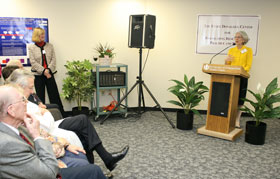  |
| HOME | THIS ISSUE | CALENDAR | GRANTS | BACK ISSUES | < BACK | NEXT > |
Center to foster translation of medical research into practiceby Steven Veshosky - March 26, 2007 |
||||
| The Patrick & Catherine Weldon Donaghue Medical Research Foundation has pledged $1.75 million to name and support The Ethel Donaghue Center for Translating Research Into Practice and Policy (TRIPP) at the Health Center. The center is the result of a year-long planning effort, led by Dr. Judith Fifield and advised by an interdisciplinary team from across the University. Its mission directly responds to the National Institutes of Health “Roadmap” initiative to foster practice-oriented health services research and researchers. The Roadmap emphasizes programs that warrant particular attention due to their cross-cutting relevance or complexity. The TRIPP Center, formerly known as the Health Policy and Primary Care Research Center, is being developed into a cross-departmental center for Type 2 research. This type of research is intended to translate the results of clinical trials into practice by providers, for the benefit of patients. The Donaghue grant, supplemented by funds from the University, will be spread over five years. “Both the Donaghue Foundation and the University should take great pride in the progressive thinking that makes this possible,” says Fifield. “There were risks involved here. We’re trying to do things in a different way than they’ve been done in the past, and that means taking some chances. But we believe the end result will be well worth the risk.” Healthcare organizations are constantly pressured to accelerate the methods through which research can be of direct benefit to patients. There is, however, little agreement about how best to accomplish this in ways that are cost-effective, culturally sensitive, and have a reasonable chance of being implemented. A medical sociologist with a background in nursing, Fifield is especially concerned with moving research from the clinical trial stage into the community and primary care practices.
She and her team work to translate guidelines and standards of care based on scientific evidence into methods that work for providers and the community, so that patients can benefit as soon as possible. Much of the research conducted by the TRIPP Center focuses on low income and underrepresented populations that traditionally have the least access to health care and a disproportionate amount of need. “There is a gap of approximately 17 years, according to the Institute of Medicine, for the results of a clinical trial to find their way into the hands of providers so that they can actually impact patient care,” says Fifield. “And this is made worse by poverty and its associated problems. What we’re trying to do is include practitioners in the research process, so the translation will be easier and patients will benefit sooner.” Some projects that Fifield has directed in the past include Sister Talk Hartford, a faith-based weight-loss program focusing on black and African-American women in their churches, and a pediatric asthma study known as the UCAN Control Asthma Program (UConn Health Center and Community Health Network Asthma Network). The TRIPP Center also actively supports Safety.Net, a statewide collaborative of community health centers and poverty clinics committed to using health information technology to deliver high quality, patient-centered health care to the state’s low-income, uninsured and publicly insured residents. The center is working with the Safety.Net collaborative to explore grant opportunities, build coalition membership, and provide information to guide decision-making about future projects and directions.
|
| ADVANCE HOME UCONN HOME |

